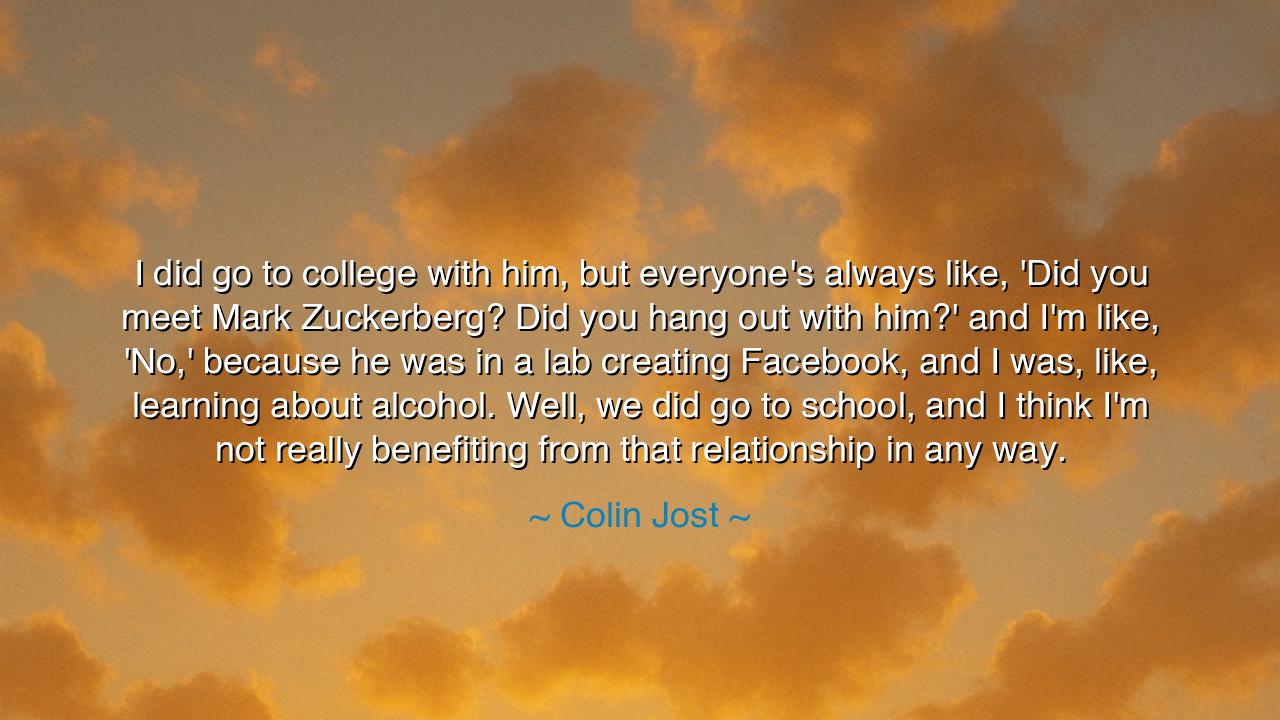
I did go to college with him, but everyone's always like, 'Did
I did go to college with him, but everyone's always like, 'Did you meet Mark Zuckerberg? Did you hang out with him?' and I'm like, 'No,' because he was in a lab creating Facebook, and I was, like, learning about alcohol. Well, we did go to school, and I think I'm not really benefiting from that relationship in any way.






“I did go to college with him, but everyone's always like, 'Did you meet Mark Zuckerberg? Did you hang out with him?' and I'm like, 'No,' because he was in a lab creating Facebook, and I was, like, learning about alcohol. Well, we did go to school, and I think I'm not really benefiting from that relationship in any way.” — so jested Colin Jost, the humorist and storyteller, whose wit hides a deeper wisdom beneath laughter. Though spoken in lightness, his words carry the quiet weight of reflection — a truth about destiny, discipline, and the differing roads men walk toward greatness. In the rhythm of humor, Jost reminds us that while some build empires, others build experiences; and both, in their own way, are teachers of life.
Colin Jost, famed for his work as a writer and comedian, delivered these words with the tone of mirth that conceals insight. He and Mark Zuckerberg, both students of Harvard, shared the same halls and years — yet one retreated into invention while the other ventured into satire. When Jost quips that Zuckerberg was “in a lab creating Facebook” while he was “learning about alcohol,” he captures the eternal contrast between the focused creator and the wandering dreamer. Yet beneath the humor lies a profound truth: that every path, whether filled with ambition or folly, teaches in its own time.
In his jest, Jost unveils a lesson about purpose and attention. Zuckerberg, consumed by a singular vision, forged a creation that would alter the fabric of human connection. Jost, meanwhile, found his calling in laughter, learning perhaps not through laboratories, but through the observation of human folly — which, too, is a kind of study. His humility in acknowledging, “I’m not really benefiting from that relationship,” is not envy, but acceptance — an understanding that each man must bear the fruits of his own choices, and that no borrowed greatness can replace the value of one’s own journey.
The ancients would have recognized this wisdom. In the days of Socrates, there were those who studied the stars, and those who studied the soul. One built systems of logic; the other built understanding. Yet neither could replace the other, for the philosopher who spends his life gazing at the heavens may miss the laughter of men, while the poet who delights in mirth may never touch the stars. Each man learns according to his nature, and the wise do not compare their paths, but walk them with courage.
Consider the story of Nikola Tesla and Thomas Edison, two minds of electric genius. Edison labored endlessly, testing thousands of materials to find the one that would light the world. Tesla, in contrast, dreamed in visions and sought elegance through thought. Their rivalry revealed that genius takes many forms — one born of tireless persistence, the other of imagination and abstraction. Jost’s story echoes this truth in a modern mirror: Zuckerberg, the builder of platforms, and Jost, the builder of laughter, each followed their callings, each contributing light to the world in his own way.
In saying he was “learning about alcohol,” Jost also hints at another ancient lesson — that wisdom often hides in folly. The young who stumble through confusion, pleasure, and error are not necessarily lost; they are learning the texture of life. For what the scholar learns in silence, the fool learns in chaos. Both acquire knowledge, though by different roads. Perhaps Jost, through humor and hindsight, came to understand that his “learning” prepared him to understand people — their joys, their weakness, their absurdity. The seeds of comedy, after all, grow best in the soil of lived experience.
The heart of his quote, then, is not one of regret, but of acceptance and self-awareness. It teaches us not to measure our worth by comparison, but by authenticity. The world may praise the inventor, but it also needs the storyteller; it may glorify the builder, but it also treasures the jester. The important thing is not to envy another’s calling, but to recognize one’s own. Each person’s success blooms in its own season, and those who remain true to their craft — whether in solitude or in laughter — will find fulfillment beyond wealth or fame.
Therefore, my children, remember this lesson: do not compare your journey to another’s. The paths of destiny are many, and no two are the same. One may labor in a lab, another in the theater of life; one may change the world through machines, another through words. Learn from both. Embrace your calling, whatever form it takes. Be humble enough to laugh at your missteps, but wise enough to learn from them. For as Colin Jost reminds us, even humor can be a mirror for truth — that what defines a life is not proximity to greatness, but the courage to live one’s own story with honesty, humility, and joy.






AAdministratorAdministrator
Welcome, honored guests. Please leave a comment, we will respond soon